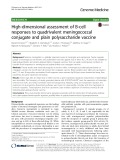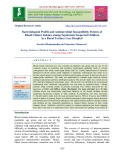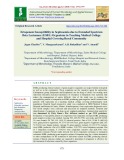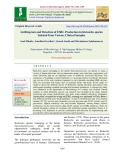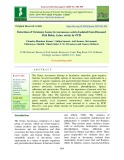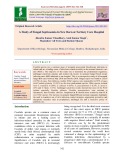
Organisms causing septicaemia
-
Neisseria meningitidis is a globally important cause of meningitis and septicaemia. Twelve capsular groups of meningococci are known, and quadrivalent vaccines against four of these (A, C, W and Y) are available as plain-polysaccharide and protein-polysaccharide conjugate vaccines.
 15p
15p  vioraclene
vioraclene
 31-03-2024
31-03-2024
 4
4
 1
1
 Download
Download
-
Blood stream infections are very common in paediatric age group and are one of the common causes of morbidity and mortality. Septicaemia gradually leads to serious consequences like shock, multi organ failure, DIC etc. Timely identification of causative pathogen by blood culture (gold standard) is important. Antibiogram also helps us to elevate consciousness on resistance problems and recognise prospect to decrease the use of inappropriate antibiotics. The study was undertaken to evaluate major bacterial isolates causing septicaemia and their antibiogram pattern.
 5p
5p  cothumenhmong9
cothumenhmong9
 18-01-2021
18-01-2021
 13
13
 2
2
 Download
Download
-
ESBL producing clinical isolates of gram negative organisms are major burden in hospital as well as in the community. These organisms are the causative agent for septicemia. Carbapenem group (Imipenem and Ertapenem) are the drug of choice for treating such infections. Recently increased incidences of resistance to Imipenem were reported, that makes the management of sepsis difficult.
 7p
7p  quenchua6
quenchua6
 15-06-2020
15-06-2020
 7
7
 1
1
 Download
Download
-
Klebsiella species belonging to the family Enterobacteriaceae, are known to cause a variety of human infections such as pneumonia, urinary tract infections, septicaemia, soft tissue infections and are an important cause of healthcare associated infections. The emergence of multidrug resistant Klebsiella is a growing problem worldwide. Klebsiella spp. are one of the most common organisms to carry plasmids encoding ESBL enzyme. They are associated with higher rates of treatment failure and death.
 6p
6p  chauchaungayxua5
chauchaungayxua5
 05-05-2020
05-05-2020
 19
19
 2
2
 Download
Download
-
Blood stream infections are mainly caused by multi drug resistant organisms which more likely prolong the hospital stay and leads to increased health care costs. Hence, early diagnosis and treatment with appropriate antibiotics is the only way to treat bacteraemia. To study the bacteriological profile of the organisms causing septicaemia and their antibiotic resistance patterns to guide the clinicians to initiate the empirical therapy. Blood samples were collected aseptically from patients before taking any antibiotics.
 7p
7p  cothumenhmong3
cothumenhmong3
 22-02-2020
22-02-2020
 16
16
 0
0
 Download
Download
-
The Genus Aeromonas belongs to facultative, anaerobic gram negative bacteria. Several mesophilic species of Aeromonas cause septicaemia in a variety of aquatic organisms and gastrointestinal diseases in humans. The virulence of Aeromonas is considered multifactorial and are known to possess aerolysins, hemolysins, proteases, phospholipases, lipases, adhesions and enterotoxins. Therefore, the importance of present work lies in detecting the virulence genes in Aeromonas sobria isolated from diseased fish, rohu.
 7p
7p  nguaconbaynhay3
nguaconbaynhay3
 07-02-2020
07-02-2020
 14
14
 1
1
 Download
Download
-
Candida species are a common cause of neonatal nosocomial bloodstream infections in infants and are a leading cause of infectious-related mortality in the neonatal intensive care unit (NICU). The objective of this study was to determine the predominant organisms, antifungal sensitivity patterns and clinical risk factors in neonatal fungal blood stream infection cases (BSI) admitted to our hospital. This is a retrospective study of all neonatal fungal BSI cases between May 2018 and October 2018. Fungal sepsis was found in 25/210 (11.9%) of cases.
 7p
7p  nguaconbaynhay1
nguaconbaynhay1
 08-12-2019
08-12-2019
 16
16
 1
1
 Download
Download
-
Invasive Meningococcal Disease results from bacterial infection with Neisseria meningitidis, a gram-negative aerobic organism that is usually a commensal in humans; 5-25% of adults are asymptomatic carriers. 8 Meningococci that cause invasive disease develop a capsule that protects the organism from host defence mechanisms.
 79p
79p  can_thai
can_thai
 12-12-2012
12-12-2012
 64
64
 5
5
 Download
Download
CHỦ ĐỀ BẠN MUỐN TÌM








